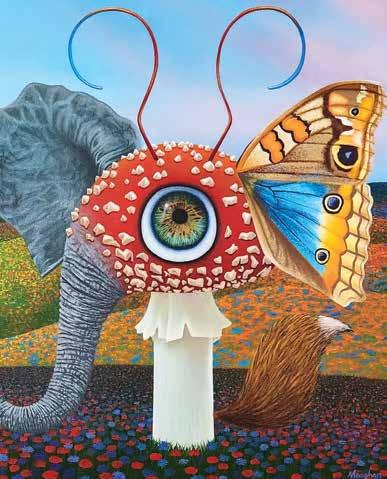
5 minute read
Spirit Wrestlers
Doukhobor Life in Canada
by Margaret Tessman
Advertisement
Ahna Berikoff is a West Kootenay-based retired instructor and academic with deep roots in the Doukhobor community. Much has been written about the Doukhobors in the past that has created disparaging narratives and stereotypes. “To challenge those stereotypes we need to broaden the scope of understanding of the Doukhobors and who they are as a people,” says Berikoff. She wrote her Ph.D. thesis on the Doukhobors and has worked as an associate professor at MacEwan University in Alberta and prior to that as a child and youth educator in B.C.
“My understanding of inequity and oppression informs my work. When I teach, I am transparent about my Doukhobor identity. It’s key to me and how I relate in the world.” Berikoff raised her sons in the Russian language and with traditional Doukhobor cultural values. She sees balanced historical information as a fundamental ingredient of community connection. “It’s important to me for adults, youth and children to have knowledge of where they come from, have pride in their identities and not internalize the disparaging discourses that have been generated over time.”
To help present a non-biased view of Doukhobor history and culture, Berikoff has collaborated in the production of a digital project, Doukhobor Life in Canada. Part one, completed in May 2022, comprises an introductory video and four 12-minute videos that describe early Doukhobor history: their trajectory across Russia, their belief systems, oppression, key events and immigration to Canada. Each video is highlighted with photos and song and the website also features “Community Conversations,” recorded interviews with two West Kootenay couples and an individual from Saskatchewan about how Doukhoborism informs their lives. “I hope that the project will shed a different kind of light about the Doukhobors, move away from the debilitating narratives and engender curiosity, empathy and conversations,” says Berikoff. “We want to create a different kind of narrative about the Doukhobors with Doukhobor input and agency.”

Above: Narrators Ryan Dutchak and Faith Malakoff take a break during filming. Opposite: Bread, salt and water are the traditional Doukhobor sacred symbols.
Photos: Ahna Berikoff
Part two of the project is in the works and is centred on the heritage and culture of the Doukhobors in Canada, specifically Saskatchewan, Alberta and B.C., including the Kootenay area. Berikoff and long-time colleague Sharon Nazaroff settled on presenting the material in a digital format as easily accessible and learnable for people. “It’s a great educational opportunity,” says Berikoff. “People can watch from home or in community venues.” Nazaroff is an early childhood educator and currently a trustee for School District 8 (Kootenay Lake). Extensive research, consultation with Doukhobor scholars and historians, writing, filming and editing took place in the development of the project. As well as Berikoff (research, writing, editing, directing) and Nazaroff (administration), the core crew included Nelson filmmaker Carlo Alcos (videography and film editing) and narrator and videographer Robert Chursinoff, and narrators Faith Malakoff with a Sons of Freedom Doukhobor heritage and Ryan Dutchak with an Independent Doukhobor heritage. “Carlo has a fine ethic and an affinity for social justice issues,” says Berikoff. “Both Carlo and Rob created an atmosphere of ease for narrators Faith and Ryan.” Chursinoff is a writer and professional musician who recently published his first novel, The Descendants.
The history of the Doukhobors in Canada began in the late 19th century with the migration of the sect from Russia to the Prairies and beyond. Oppressed in their homeland because of their cultural beliefs and practices, the Doukhobors found refuge in their new home, but also clashed with colonialism in many areas of their lives. “When the Doukhobors arrived in Canada I don’t think they knew what they would be facing,” says Berikoff. Their differing responses to governmental pressures, assimilation and the consequences of resistance impacted the different forms and directions Doukhobor groups eventually took.
There are three distinct Doukhobor groups: the Independent Doukhobors, the USCC (Union of Spiritual Communities of Christ) and the Sons of Freedom Doukhobors. Individual Doukhobors may have roots in more than one of the groups, while identifying more strongly with a particular group or not identifying with any group. Although there are differences, each group identifies as Doukhobor in their fundamental belief systems and values. Doukhobor means “spirit wrestler” in Russian, a term originally applied to the Doukhobors by the Russian Orthodox Church in 1785 and meant as a derogatory label. Doukhobors came to embrace the name as meaning to wrestle with rather than against the spirit, along with the sacred symbols of bread, salt and water that are present at Doukhobor services and that represent the basic principles of hospitality, respect and “Toil and Peaceful Life.”
Berikoff’s aim for the project is to give Doukhobors and nonDoukhobors alike the best version of Doukhobor culture and history, and to ensure that old stereotypes are put to rest. “I want to contribute to fostering a sense of understanding, pride and interest in our Doukhobor identities.
“It’s important to us to tell our own stories in our own voices in our own way.”
The videos and “Community Conversations” can be found on the project website, doukhoborlife.ca.










